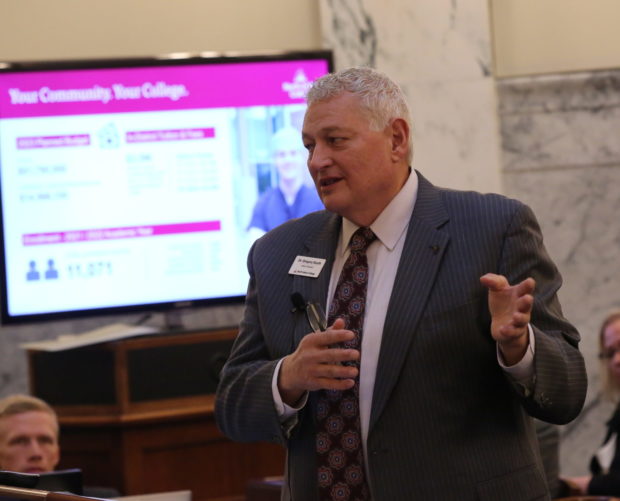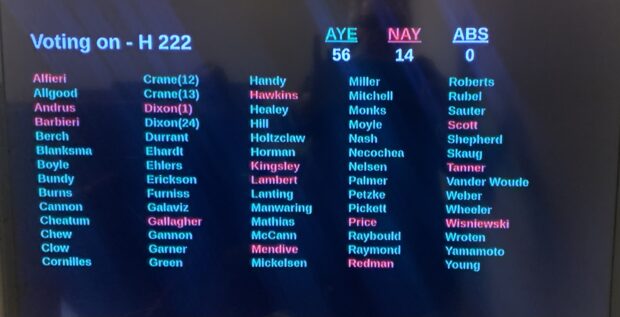(UPDATED, 9:32 a.m. Monday, to correct timeline for NIC “show cause” letter.)
The embattled North Idaho College is staring at a $450,000 budget hit.
The Joint Finance-Appropriations Committee rejected three new administrative hires at NIC, a Coeur d’Alene-based community college at risk of losing its accreditation.
Specifically, JFAC rejected three line items: a “first-year experience director” for new students; a new dean of students position, and a new IT services coordinator. The three positions carried a pricetag of $454,300.
JFAC wants to move this $454,300 into employee pay raises at all four community colleges, including NIC. The idea behind this shift is to fully fund Gov. Brad Little’s request for a 4% pay raise, without forcing the community colleges to use tuition or local property taxes to pick up the slack.
The proposed budget cuts come as NIC’s accreditation faces a new threat, and the college is under a deadline. Last month, a regional panel said the college trustees have failed to take the risk to accreditation seriously — and have demanded that NIC make a written case explaining why it should remain accredited. That response is due March 31.
If NIC loses accreditation, students would not be able to transfer their credits to other colleges, and they would not qualify for state-funded scholarships.

NIC interim President Gregory South attended Thursday morning’s committee hearing; afterwards, he said the budget cuts were not unexpected. He credited JFAC for funding the community college pay raises.
“Generally, it’s positive,” said South, hired by a divided board of trustees to take over for President Nick Swayne, who remains on paid administrative leave. “One thing that I’ve found about this legislature, is that they try to be fair.”
For the College of Western Idaho, Idaho’s largest community college, the proposed budget is something of a mixed bag.
Budget-writers approved nearly $1.1 million in line items for CWI: to increase nursing capacity; to increase capacity in the STEM fields of science, technology, engineering and math; and student outreach and recruiting.
But like NIC, CWI could lose money based on a complex formula, known as enrollment workload adjustment, which measures student credit hours and enrollment. CWI stands to lose $383,000, while NIC stands to lose $242,500.
CWI’s cut could have been deeper, however. The enrollment workload adjustment formula called for a $766,000 cut for CWI. Budget-writers went with a smaller cut — and CWI President Gordon Jones said that move reflects enrollment changes at the college. Headcount at CWI is increasing, largely in areas such as dual-credit classes, adult education, and career-technical programs and employee training.
All told, the budget proposal would put $61.7 million of state taxpayer dollars into community colleges, a 6.9% increase. Community colleges also receive funding from property taxes and student tuition and fees.
JFAC passed the budget on a unanimous 20-0 vote, and the bill now must pass the House and Senate.
House passes budget to offset costs from U of I homicides
 Without debate — but not without dissent — a University of Idaho budget bill passed the House.
Without debate — but not without dissent — a University of Idaho budget bill passed the House.
House Bill 222 provides $1 million to help offset some costs stemming from the Nov. 13 slayings of four U of I students. The $1 million would help cover increased campus security and Idaho State Police patrols, student counseling and the cost of a Nov. 30 vigil honoring the victims: Ethan Chapin, 20; Kaylee Goncalves, 21; Xana Kernodle, 20; and Madison Mogen, 21.
Fourteen House Republicans voted against the budget, but no lawmakers debated the bill to explain their opposition. And two of the no votes came from JFAC members who approved the budget in committee: Reps. Tina Lambert of Caldwell and Josh Tanner of Eagle.
The budget now goes to the Senate.
House makes short work of two other bills
Two other House votes happened quickly Thursday afternoon.
The House passed House Bill 181 — which would increase the Advanced Opportunities line of credit from $4,125 per student to $4,625. The bill also would allow students to use their $4,625 to take as many career-technical education courses as they’d like. The bill passed, 65-0.
Minutes later, the House passed House Bill 220, which would require schools to accept cash for admission to sporting events. That bill passed on a 59-9 vote.
Both bills now go to the Senate.
Corporal punishment, student restraint bill on hold
Citing concerns about wording, the House Education Committee put the brakes on a bill that would ban the use of corporal punishment and restraint as classroom punishment.
Committee members said they want the sponsor, Rep. Marco Erickson, R-Idaho Falls, to rework the bill.
As written, House Bill 218 would outlaw the use of chemical restraints, with the exception of drugs and medications “prescribed by and administered in accordance with the directions of a qualified health professional.” Erickson and State Department of Education special education director Julie Mead said chemical restraints are not common practice, but the bill is designed to restrict its use.
“No other method, no other concoction you can make up, can be used in any form,” said Erickson, responding to a question from Rep. Lance Clow, R-Twin Falls.
Lawmakers said wording elsewhere in the bill could allow expanded use of chemical restraints.
The committee put HB 218 on hold and urged Erickson to rewrite it.
“It’s a messy business, but we get there slowly but surely,” said House Education Chairwoman Julie Yamamoto, R-Caldwell.
Senate committee approves parental rights bill, despite concerns
State superintendent Debbie Critchfield’s parental rights bill passed the Senate Education Committee unanimously, despite some concerns from committee members.
House Bill 163 names parents the “primary stakeholders” in their children’s education. It ensures parents have access to education and health records; requires parental consent for student well-being surveys; and ensures “reasonable access” for parents to visit a school.
But committee members took issue with one clause of the bill. It would ensure parents are notified if law enforcement interrogates their child, unless the child is a victim or suspected victim of child abuse. The intent is to prevent suspected abusers from being notified.
But Sen. Scott Herndon told Critchfield the section needs specification.
“I think it’s problematic if we leave it just like this because it looks like we’re now prohibiting notification,” said Herndon, R-Sagle.
Several parents spoke in support. One Kuna mom called the bill a “huge victory for parental rights in education.”
After deliberating a possible amendment, the committee voted unanimously to send the bill to the Senate floor. Herndon said a trailer bill could follow to clarify HB 163’s intent.
Two education bills fly through the Senate
Lawmakers passed Senate Bill 1015, which slightly amends language around the extended learner programs in Idaho schools. The amendment fixes an issue to ensure only full-time public school students are eligible for the program.
SB 1015 passed 29-6.
Sens. Daniel Foreman, R-Moscow; Phil Hart, R-Kellogg; Scott Herndon, R-Sagle; Brian Lenney, R-Nampa; Tammy Nichols, R-Middleton; and Glenneda Zuiderveld, R-Twin Falls, voted against the bill.
And the Senate unanimously approved another technical change. Brought forward by Sen. Lori Den Hartog, the bill changes the language of an existing statute to ensure career technical education “centers” can receive funding, rather than just career technical education “schools.”
